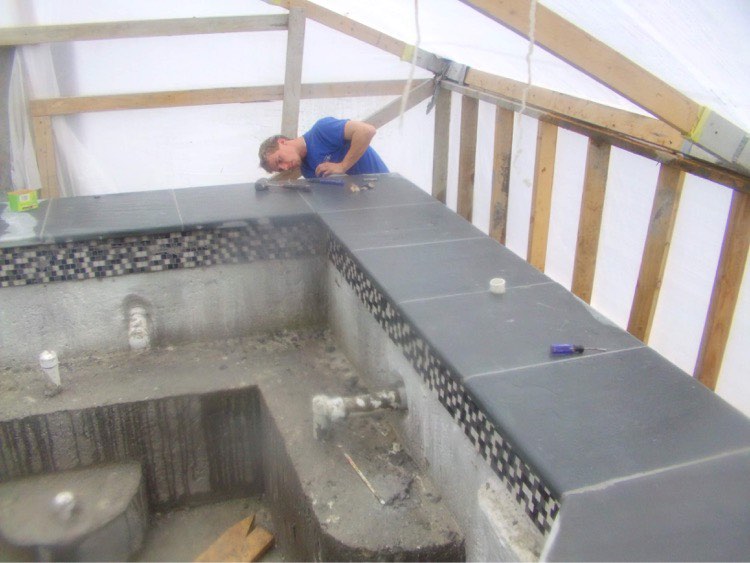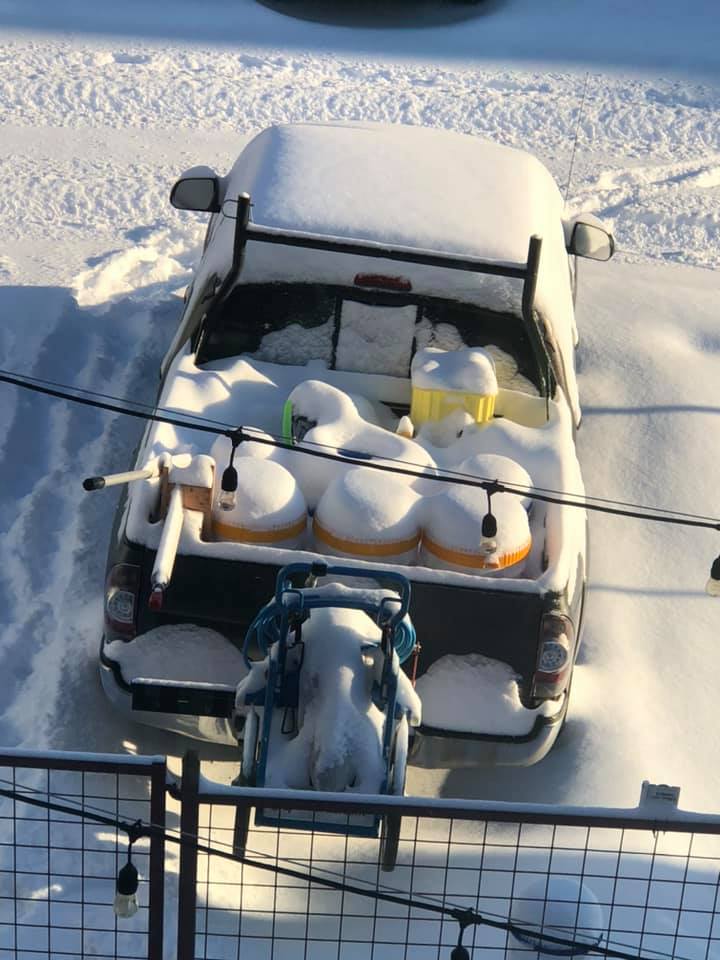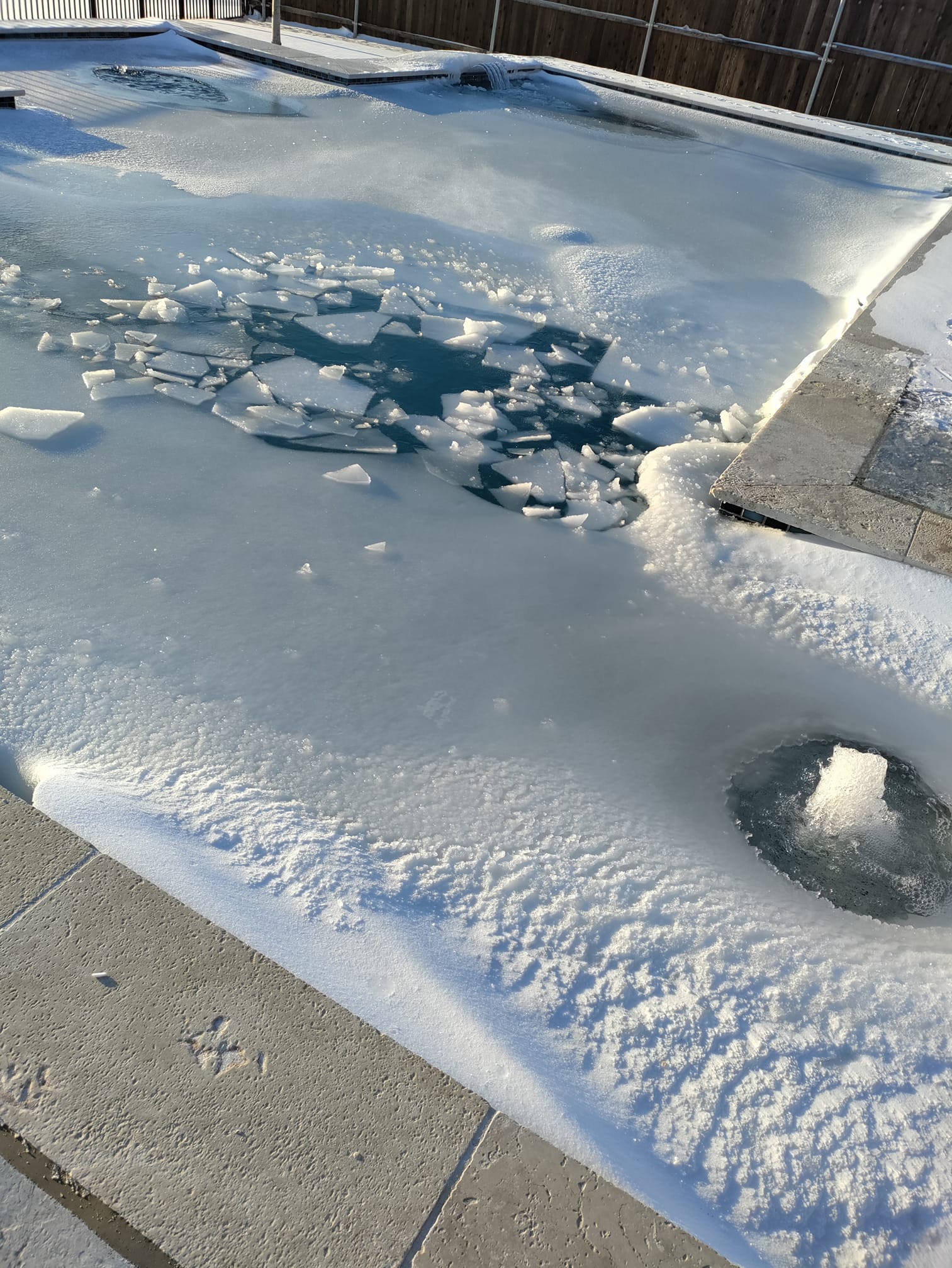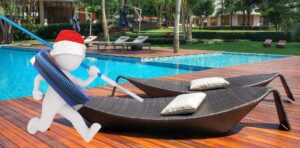If you own a swimming pool and have winterized it because you are in an area where that is the common practice – This is NOT for you! You have already taken all of the precautionary measures that you can (if winterized correctly) to ensure minimal to no freeze damage over the winter months. I have spent a good portion of my pool industry career in a winter market and can tell you winterizing a pool properly is the best protection you will get When the Pool Water Freezes.

In The Threat of A Hard Freeze
However, if Jack Frost caught you with your pool open and your pants down, we are in a bit of a spot and probably a little worried. Yes, if the water in the pool is frozen, it is too late to winterize. You likely live in an area where the necessary products aren’t available anyway. Don’t stress. Although we didn’t plan for this, we can still take a few steps to minimize the damage.
.
IMPORTANT:
WATCH THE NEWS, CONTACT YOUR ELECTRIC COMPANY. If you are in an area where they will be exercising rolling blackouts, you will need to winterize your pool to the best of your ability. It Will not likely be a complete ‘Northern pool’ winterization at this time; we will have to do the best we can. If you cannot do any of the steps bullet-pointed below, understand that these are extreme circumstances, and all you can do is the best you can. If there will NOT BE rolling blackouts in your area, please skip the following bullets and proceed to the next section.
- Do Not lower the water level in the pool
- Shut off power to swimming pool equipment
- Remove trippers from your time clock
- Shut off the circuit breaker for equipment power
- Remove freeze plugs and place them in the pump basket
- Your filter will have a qty of one freeze plug
- Open all air relief valves & remove pressure gauges
- Your Pump will have either one or two freeze plugs
- One freeze plug will be in the very front of the pump toward the bottom
- You may or may not have an additional freeze plug on the side of the pump near the bottom.
- Repeat these steps if you have a booster pump for your automatic pool cleaner.
- Your filter will have a qty of one freeze plug
- Remove Automatic Pool Cleaner from the pool if it has not yet frozen over.
- Manipulate all valves to the open position
- Place the handle selection of your multiport valve (if present) in between any two settings – or in ‘winterize’ selection
- DE (Diatomaceous Earth) Filter – If you can disassemble and remove the grid assembly, there will be less moisture inside the tank that could freeze.
- Store assembly in a non-freezing location
- Cartridge Filter – If you can disassemble and remove the element, there will be less moisture inside the tank that could freeze.
- Store element in a non-freezing location
- Turn Off Power & Circuit Breaker to Pool Heater
- Turn off the gas valve
- Remove drain plugs (qty of 2 to 4 depending upon the model of the heater)
- Remove basket from pool skimmer and add an empty quart bottle filled 1/2 way with swimming pool antifreeze
- Saltwater pool
- remove, drain, and store the salt cell in a non-freezing location.
- Connectors should be capped with the original protective covers to not completely dry and damage the cell’s sensors.
- Remove any remaining chlorine or bromine from the feeder (if one is present).

If Rolling Blackouts Are NOT Scheduled

Wrapping all of your pool equipment and exposed plumbing in blankets is probably not going to help. This exercise does not warm anything. All a blanket does is retain heat when something that generates heat is covered by one. The only equipment you have that will generate heat is your pool pump motor and heater (if you have one), and these two items should NEVER be wrapped or covered. Unless we are looking at ‘tenting’ the equipment (see photo on left – courtesy Dan Lenz, All Seasons Pools & Spas, Inc.).
All of the equipment may get some warmth from the pump in that scenario, but again the heater should not be included. That is unless you have an electric heat pump in which case the pump motor may get the tented area warm enough (45°F+) for the unit to operate.

Gas, Gas, Gas!
Your pool motor requires adequate ventilation to operate. If starved of airflow, it can and will overheat, and the cooling fan inside the motor and other abs internal components can melt, crack, warp, or ignite. A heater produces dangerous fumes when operating, and proper outdoor uncovered ventilation is critical.

When the Pool Water Freezes
If your plumbing is not currently frozen, the best method of protection for a non-winterized pool in the threat of a hard freeze (air temperature less than 32°F for a period of four hours or more) is a running pump. I’m not talking about the freeze protect function in a variable speed pump where it will move a little water every two minutes, although, in a typical freeze, I’m sure that would work fine. I mean, right now to run your pump as if it was mid-June, variable speed pumps on high flow, and for 24/7 until the threat of the hard freeze is gone.

Poolcicle
Running water does not freeze as quickly as water that is not moving. If the surface of the pool is NOT already frozen and you can easily manipulate your return jets, point them toward the water’s surface. This may help prevent the pool from freezing. You will need to keep tabs on a climbing pH should you cause turbulence at the pool’s surface. DO NOT chip away at the ice to get to these! If it’s already frozen, it’s frozen. Your pool should be able to handle this – pools in the northern states do every year.

Pool Antifreeze
If you have a weir flap you can easily remove, take it out. An empty water test bottle filled halfway with swimming pool antifreeze can be placed into the skimmer basket. Make sure it is sealed tightly and swimming pool antifreeze specifically is used. This will aid in taking up pressure from the expansion of ice should the surface water in the skimmer freeze
Need a Pillow
If you have an aboveground pool and are worried, you can toss an inflatable float or tire tube into the pool. This may help take up the expansion of ice. That should lessen the pressure on the pool wall. The same reason folks with pools in a closing market utilize air pillows under their pool covers.
Turn Up The Heat
Suppose you have a heater on your pool. In that case, it should be okay to operate. This is providing your pipes are not currently frozen; you must be able to generate the water pressure required by the unit to operate. The heater is not wrapped or covered for the reasons discussed above. You will also need to determine your heater’s minimum recommended operating temperature. You can get this info from either your owner’s manual or by contacting the manufacturer.

All Day, All Night
You will need to ensure you operate the unit above that temperature and then run it continuously. For example, if the manufacturer states that the unit should not operate at a temperature below 70°F, then don’t set the temperature below 70°F. You’ll obviously need to select the temp for the water 71°F or higher.
NOTE: You may get condensation that is slightly acidic (same pH as a cup of black coffee) and potentially damaging to some heater components if operated in these conditions over a significant length of time.

Don’t be a Dumbass!
Finally, DO NOT walk across or play on top of a frozen pool. Not now, not ever. This is NOT safe. The ice can crack, and you can fall into the frigid water, and it may be tough to get out. You will also be setting a horrible example for any children that may see you do this. It will be much more challenging for a child to escape a frozen pool after falling in. Pool Water Freezes, but it may not be frozen solid enough to handle the weight.






